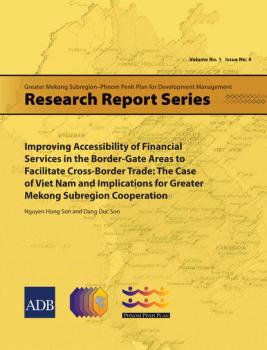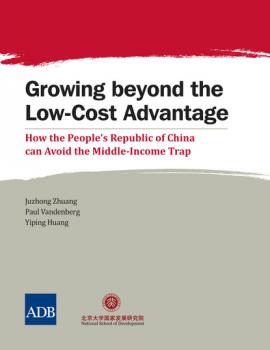ТОП просматриваемых книг сайта:
ЛИТМИР - LITMIR.BIZ - Электронная библиотека
Скачивание или чтение онлайн электронных книг.Improving Accessibility of Financial Services in the Border-Gate Areas to Facilitate Cross-Border Trade - Nguyen Hong Son
Greater Mekong Subregion-Phnom Penh Plan for Development Management Research ReportsАннотация
This series features the scholarly works supported by the Phnom Penh Plan for Development Management, a region-wide capacity building program of the Asian Development Bank that supports knowledge products and services. It seeks to disseminate research results to a wider audience so that policy makers, implementers, and other stakeholders in the Greater Mekong Subregion can better appreciate and understand the breadth and depth of the region's development challenges.
Информация о книге
Автор произведения Nguyen Hong Son
Жанр Экономика
Серия Greater Mekong Subregion-Phnom Penh Plan for Development Management Research Reports
Аннотация
The economic success of the People's Republic of China (PRC) over the last three decades has brought with it new challenges. With a per capita gross national income of $4,930 in 2011, the PRC has just passed the threshold of upper-middle-income status and it still has a long way to go before becoming a high-income country. But with rising wages and population aging, growth will have to be increasingly driven by productivity improvement through innovation and industrial upgrading–the PRC needs to move from a lowcost to a high-value economy. Moreover, rapid growth has exposed several structural problems, in particular, economic imbalances, rising inequality, resource constraints, and environmental degradation. If not addressed, these problems could hinder PRC's efforts in moving toward a high-value economy and increase the risk of getting caught in what is increasingly known as the «middle-income trap.»
Аннотация
The rapid economic growth of the People's Republic of China (PRC) over the last 30 years has generated many environmental problems and a concomitant rise in the number of environmental disputes. Until 1989, legal cases arising from these disputes were usually heard in the people's courts of general jurisdiction. In that year, however, the development of the environment court system accelerated, leading to the creation of 11 such courts for pilot cases, a sign of the high priority the PRC has given to environmental protection over the past two decades. This publication examines the effectiveness of environment courts in the PRC and elsewhere, so that the lessons learned can be applied in the PRC and in other developing countries. It also recommends ways to promote environmental justice in the PRC, given that the 11 environment courts are no longer enough to handle the rapidly increasing caseload throughout the country.
Global and Regional Development and Impact of Biofuels - Jun Yang
Greater Mekong Subregion: Status and Potential for the Development of Biofuels and Rural Renewable EnergyАннотация
This report summarizes the findings of the Asian Development Bank's technical assistance project TA-7250: Cross- Sectoral Implications of Biofuel Production and Use in India. Implementation of its national biofuel policy will help offset the effects of oil price increases on the economy of India in the next 2 decades. The advantages of biodiesel, as a supply-side response to counter the adverse impacts, are significant. Bioethanol, in contrast, will not generate sufficient economic benefits to justify social costs. Therefore, first-generation bioethanol has limited scope in India. As these biofuels compete for agricultural resources and compromise food security, a combination of policies–biodiesel expansion, energy efficiency improvements, and food productivity increase–will provide India with better energy security, food security, and opportunities for inclusive growth and carbon emission reduction.
Аннотация
The Government of Pakistan has adopted laws to combat adverse environmental impacts of unsustainable development, but there are several issues that make effective implementation of these laws and adjudication of environmental disputes difficult. This report examines the state of environmental law, adjudication, and implementation in Pakistan, focusing on the provincial environmental protection acts of Pakistan and the institutional design, principles, and procedures provided under the law. It further examines the actual implementation of the law and the case law developed in this area with focus on the court's interpretation and enforcement of the laws. The report also reviews the curriculum of law schools and judicial academies and suggests the future inclusion of environmental laws in their respective programs.
Аннотация
The finance sector in Bangladesh remains at an early stage of development. It needs to be strengthened and invigorated so it can fulfill its dual role of reducing poverty and promoting economic growth. This book presents a comprehensive analysis of the finance sector in Bangladesh and pinpoints areas of weakness in its subsectors.
Аннотация
Economic growth has multiplied the environmental challenges faced by the People's Republic of China but has also created opportunities, by increasing available funding for environmental management and conservation. At the nexus of these countervailing trends, policy makers have been experimenting with new approaches to environmental management under the broad heading of «eco-compensation». Many of these are market-based, particularly payments for ecosystem services; an emerging policy debate is regarding the extent to which beneficiaries should pay, and the providers should be compensated, for the provision of natural resources and environmental services to promote sustainable, balanced growth. This paper synthesizes the findings of the International Conference on Payments for Ecological Services convened in Ningxia Hui Autonomous Region in September 2009 to support eco-compensation programs in the country.
Аннотация
Mongolia experienced a challenging transition from socialist economy to market economy from 1990 onwards. Its commercial insurance market is still at its infancy, with gross written premiums in 2013 amounting to only 0.54% of gross domestic production. ADB undertook this technical assistance study to support microinsurance development in Mongolia. The study provides an overview of the development of Mongolia's insurance market in general and the microinsurance segment in particular, then identifies gaps in the insurance regulatory framework that need to be bridged to expand microinsurance coverage to more households.
Аннотация
“Smoldering Ashes Of Paradise” is the sequel to “Phoenix Rising From the Ashes.” It takes the reader on the continued journey of transformation. It is a poignant story of how the author and other victims cope with catastrophe. All of us, at one time or another face daunting challenges in our lives, and it is how we meet them that determines our ability to be transformed by them. The Paradise Fire is remembered as a catastrophe that destroyed an entire town, but as survivors, we must not remember the fire as destroying us.










